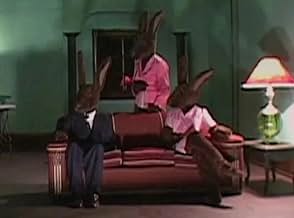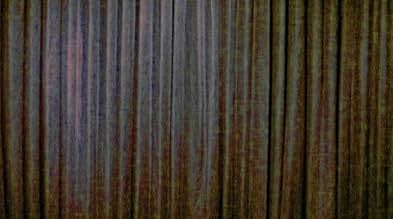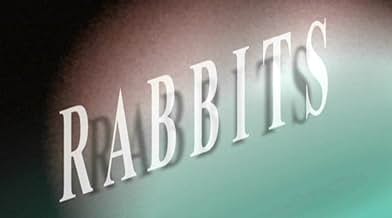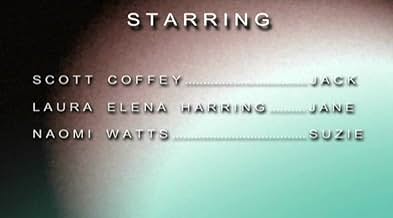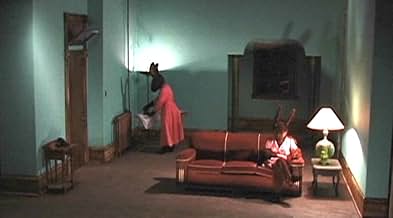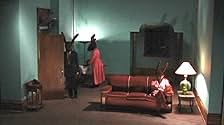Rabbits
- 2002
- 43 min
AVALIAÇÃO DA IMDb
6,9/10
8,8 mil
SUA AVALIAÇÃO
Adicionar um enredo no seu idiomaIn a nameless city deluged by continuous rain, three rabbits live with a fearful mystery.In a nameless city deluged by continuous rain, three rabbits live with a fearful mystery.In a nameless city deluged by continuous rain, three rabbits live with a fearful mystery.
Avaliações em destaque
Lynch really elevated my opinion of him here. This is very, very well constructed. It is the highest art.
That means that any "explanation" will be worthless. You can read some other material to discover something of what you will see.
Its unsettling and strange, hypnotic and lyrical. That it is in several "episodes" is all a part of how certain familiar forms are subverted to give us something that has identity and also has a sort of meta-identity defined by deviance from the expected.
My observation will be highly personal. I see this as a sort of "Rosencrantz and Guildenstern" but instead of referencing "Hamlet" engages "Alice in Wonderland." It fits, especially if you are inclined as I am to blow Alice into something as world-swallowing as Hamlet. Where Hamlet is all about what it means to sit in the world, Alice works at more refined level, being all about what it means to carry a name in the world.
One is about being and the other about what we see and acknowledge about being. Its this second conceptual space that Lynch inhabits, always has. His "firewalking" TeeVee stuff bends notions of representation and discovery, the amusement being not in what we see, but in the difference between what we expect to see.
Let's look at the entire vocabulary he has toyed with. First, he acknowledges the audience (laugh track), camera (static but in and out of focus), narrative (drawn more overtly by its fragmentation), framing (with very formal, abstract composition) and "acting," which here consists more of pauses and empty spaces than anything we normally associate with acting.
And then there's the bending of the form. We have a demon that appears twice. Its noir drawn tightly, especially since there is a hint that the demon or his avatar as perhaps a "lost dog" is driving the entire situation.
And then we have three "performances," one each by the three characters. These are accompanied by an ignited set, literally ignited. The performances, which each occupy an episode, are pretty transcendent in terms of what we would see in an ordinary drama. In such a case, each would "solo" in such a way that their soul was revealed. Its the challenge of the writer to weave this into events in such a way that we don't see the performer revealing his character overtly. This is different; all pretense is removed. The character enters and opens its heart with no narrative baggage. What the character tells us actually has more information about context than the surrounding context provides.
Ted's Evaluation -- 3 of 3: Worth watching.
That means that any "explanation" will be worthless. You can read some other material to discover something of what you will see.
Its unsettling and strange, hypnotic and lyrical. That it is in several "episodes" is all a part of how certain familiar forms are subverted to give us something that has identity and also has a sort of meta-identity defined by deviance from the expected.
My observation will be highly personal. I see this as a sort of "Rosencrantz and Guildenstern" but instead of referencing "Hamlet" engages "Alice in Wonderland." It fits, especially if you are inclined as I am to blow Alice into something as world-swallowing as Hamlet. Where Hamlet is all about what it means to sit in the world, Alice works at more refined level, being all about what it means to carry a name in the world.
One is about being and the other about what we see and acknowledge about being. Its this second conceptual space that Lynch inhabits, always has. His "firewalking" TeeVee stuff bends notions of representation and discovery, the amusement being not in what we see, but in the difference between what we expect to see.
Let's look at the entire vocabulary he has toyed with. First, he acknowledges the audience (laugh track), camera (static but in and out of focus), narrative (drawn more overtly by its fragmentation), framing (with very formal, abstract composition) and "acting," which here consists more of pauses and empty spaces than anything we normally associate with acting.
And then there's the bending of the form. We have a demon that appears twice. Its noir drawn tightly, especially since there is a hint that the demon or his avatar as perhaps a "lost dog" is driving the entire situation.
And then we have three "performances," one each by the three characters. These are accompanied by an ignited set, literally ignited. The performances, which each occupy an episode, are pretty transcendent in terms of what we would see in an ordinary drama. In such a case, each would "solo" in such a way that their soul was revealed. Its the challenge of the writer to weave this into events in such a way that we don't see the performer revealing his character overtly. This is different; all pretense is removed. The character enters and opens its heart with no narrative baggage. What the character tells us actually has more information about context than the surrounding context provides.
Ted's Evaluation -- 3 of 3: Worth watching.
This is one of the more bizarre films featuring humans in fluffy bunny suits.
David Lynch juxtaposes Sartrean existentialism and American sitcom with an eerie, industrial-noir soundtrack to create a compelling, hellish universe like only he can.
Also, this is maybe one of the greatest uses of bunnies in storytelling, since Lewis Carroll (with the exception of Hugh Hefner).
With the recent influx of rabbit suits in other indie films, like Gummo and Donnie Darko, one can only expect this trend to grow and explode on the catwalks of Milan and Paris.
David Lynch juxtaposes Sartrean existentialism and American sitcom with an eerie, industrial-noir soundtrack to create a compelling, hellish universe like only he can.
Also, this is maybe one of the greatest uses of bunnies in storytelling, since Lewis Carroll (with the exception of Hugh Hefner).
With the recent influx of rabbit suits in other indie films, like Gummo and Donnie Darko, one can only expect this trend to grow and explode on the catwalks of Milan and Paris.
The rabbits are us in the way we live our entire lives separated from death only by our domestic routines of normalcy and our denial. Rabbits are bred for the slaughter; they live their entire lives in their little cage, surrounded by, and fed by, the very same people who will someday unthinkingly break their necks.
They're traumatized by the collective memory of past relatives being snatched from their cages while the characters themselves were still too young to fully comprehend the severity and reality of what was happening. The horrors they witnessed so long ago are now just an underlying feeling that something is wrong. They, and we, live their entire lives among death, ignorantly and purposely oblivious of it, until the one day when they are able to ignore it no more, until the day it is their turn.
That's what sense I made out of it anyway.
They're traumatized by the collective memory of past relatives being snatched from their cages while the characters themselves were still too young to fully comprehend the severity and reality of what was happening. The horrors they witnessed so long ago are now just an underlying feeling that something is wrong. They, and we, live their entire lives among death, ignorantly and purposely oblivious of it, until the one day when they are able to ignore it no more, until the day it is their turn.
That's what sense I made out of it anyway.
There's a technical term with which you must be familiar in order to begin to appreciate what David Lynch has created with this remarkable web series. That term is Diegesis which essentially means that the voices or sounds are in fact part of the world and moment which we are witnessing on screen. In the case of Rabbits it's a very intentionally open question as to just when and where and from whom is originating the spoken dialog, reinforced by the fact that we aren't able to see anyone's mouth. Perhaps the actors prerecorded their lines which are being played back as a soundtrack as they pantomime their roles? Or maybe the voices were overdubbed after the drama was videotaped? Do the words we are hearing even have anything at all to do with what we are watching? Are the words intentionally misleading so as to throw us off the trail of the real story? Is the dialog intentionally fractured & scrambled so as to disrupt any possible linear, literal comprehension? Was the dialog lifted from another source altogether?!
More questions: Are the characters, in fact, aware of each other? Maybe they are figments of each other's imagination? Maybe they are reminiscing about their pasts, recalling individual episodes of personal experiences which hold meaning only to themselves? Do these characters live together, or maybe they each individually lived in the grim apartment consecutively? Is the male rabbit a visitor? Why does the unseen, possibly imaginary audience applaud excessively when he enters the room and stands oddly at the door, almost as though uncomfortable with the warm reception? Why does the mysterious audience laugh at seemingly random moments, which I at first believed occurred only in response to any mention of time or time related concepts, but this theory soon proved unsustainable? Are the rabbits related? Is one of the female rabbits the mother and the other the wife? And just who or what the hell is that bizarre mouth like orifice that occasionally appears and drones incomprehensibly while one rabbit conducts what might be a ceremonial ritual with flashlights? And what of the intermittently igniting match that burns into the upper right corner of the screen as though signaling a moment of particular import, and which sort of resembles those odd circular dots in older films that alerted the projectionist to an imminent reel change?
Rabbits is anything but definite; it's so thoroughly, utterly indeterminate, uncommitted, tenebrous. Is it a simple Post Modern theatrical production being staged on successive nights - nine brief episodes totaling 50 minutes? Or is it a piece of Off Broadway Absurdist Theater intended as an homage to a time when commercial theater tolerated more daring, more experimental forms of drama? Is it an Off Off Broadway production still in rehearsals? Is it a security cam recording of a bit of extra curricular thespian activities? Or maybe it's even some bizarre theatrical cult that nightly conducts pagan rituals to appease the fickle and malevolent Drama Gods? Is it taking place in a theater, or on a Hollywood sound stage, or on the set of a show that David was perhaps hoping to convince some unusually brave or foolish TV executive to televise? Is it just a video record of shenanigans with some of Lynch's friends, made for their own amusement? Are they aware of what they are involved in? The possibilities are limitless as well as the questions, and that seems to be the point. Well, not the point, but the method; the method of Lynch's inspired, outrageous, ridiculous, sublime madness.
What it seems to be is a purposely abstract, incoherent, ineffable expression of pure creativity. It defies all possible labels, genres and names, and seems to relish the precarious position it occupies in my baffled, bewildered, frantically deducing mind. It exudes such a sinister, almost macabre atmosphere, and yet it dares you to assume that there's anything suspicious occurring. Theater of the Absurd came into fashion in the late 50s, but the decor on stage is late 20s or early 30s Art Deco, so it may be that the furnishings have occupied this "room" for decades. Film Noir - Lynch's preferred form of cinematic expression - also came into fashion in the 50s, and the genre thrived in the same moody ominous atmosphere that this video piece exudes, thanks to Angelo Badalamenti's signature musical score which is particularly muted and subdued. The doleful, mournful wail of a distant train whistle is nearly comical and yet so poignantly evocative, as is the omnipresent gentle storm which drenches the proceedings in a corny, maudlin, overstated gloom. The stage set might bring to mind the bleak, stark TV set apartment that Jackie Gleason's Honeymooners occupied, which only adds yet another preposterously comical layer of meaning to the mix. And yet it all adds up to something indescribably eerie and treacherous.
These furry, large eared characters might be indiscriminate, random creatures functioning as placeholders, as stand ins for real actors who may one day actually perform the piece. It seems to be suggesting that characters in drama are better seen as unreal, non human entities more appropriate and consistent with the artifice and unreality of the theatrical form. Lynch may be implying that a dramatic persona is best understood as a manifestation of a more fanciful non reality, a product of imagination & fantasy, and isn't that, after all, the essence of childhood play? But then why is it all so damn taunting and threatening?! The cumulative effect - as all the dark, dreary, heavy atmosphere might dictate - however, is not at all depressing. No, on the contrary, it's very compelling and disturbing and thrilling and wonderful. And that might be the most confounding part, just how profoundly pleasant an experience is David Lynch's Rabbits.
More questions: Are the characters, in fact, aware of each other? Maybe they are figments of each other's imagination? Maybe they are reminiscing about their pasts, recalling individual episodes of personal experiences which hold meaning only to themselves? Do these characters live together, or maybe they each individually lived in the grim apartment consecutively? Is the male rabbit a visitor? Why does the unseen, possibly imaginary audience applaud excessively when he enters the room and stands oddly at the door, almost as though uncomfortable with the warm reception? Why does the mysterious audience laugh at seemingly random moments, which I at first believed occurred only in response to any mention of time or time related concepts, but this theory soon proved unsustainable? Are the rabbits related? Is one of the female rabbits the mother and the other the wife? And just who or what the hell is that bizarre mouth like orifice that occasionally appears and drones incomprehensibly while one rabbit conducts what might be a ceremonial ritual with flashlights? And what of the intermittently igniting match that burns into the upper right corner of the screen as though signaling a moment of particular import, and which sort of resembles those odd circular dots in older films that alerted the projectionist to an imminent reel change?
Rabbits is anything but definite; it's so thoroughly, utterly indeterminate, uncommitted, tenebrous. Is it a simple Post Modern theatrical production being staged on successive nights - nine brief episodes totaling 50 minutes? Or is it a piece of Off Broadway Absurdist Theater intended as an homage to a time when commercial theater tolerated more daring, more experimental forms of drama? Is it an Off Off Broadway production still in rehearsals? Is it a security cam recording of a bit of extra curricular thespian activities? Or maybe it's even some bizarre theatrical cult that nightly conducts pagan rituals to appease the fickle and malevolent Drama Gods? Is it taking place in a theater, or on a Hollywood sound stage, or on the set of a show that David was perhaps hoping to convince some unusually brave or foolish TV executive to televise? Is it just a video record of shenanigans with some of Lynch's friends, made for their own amusement? Are they aware of what they are involved in? The possibilities are limitless as well as the questions, and that seems to be the point. Well, not the point, but the method; the method of Lynch's inspired, outrageous, ridiculous, sublime madness.
What it seems to be is a purposely abstract, incoherent, ineffable expression of pure creativity. It defies all possible labels, genres and names, and seems to relish the precarious position it occupies in my baffled, bewildered, frantically deducing mind. It exudes such a sinister, almost macabre atmosphere, and yet it dares you to assume that there's anything suspicious occurring. Theater of the Absurd came into fashion in the late 50s, but the decor on stage is late 20s or early 30s Art Deco, so it may be that the furnishings have occupied this "room" for decades. Film Noir - Lynch's preferred form of cinematic expression - also came into fashion in the 50s, and the genre thrived in the same moody ominous atmosphere that this video piece exudes, thanks to Angelo Badalamenti's signature musical score which is particularly muted and subdued. The doleful, mournful wail of a distant train whistle is nearly comical and yet so poignantly evocative, as is the omnipresent gentle storm which drenches the proceedings in a corny, maudlin, overstated gloom. The stage set might bring to mind the bleak, stark TV set apartment that Jackie Gleason's Honeymooners occupied, which only adds yet another preposterously comical layer of meaning to the mix. And yet it all adds up to something indescribably eerie and treacherous.
These furry, large eared characters might be indiscriminate, random creatures functioning as placeholders, as stand ins for real actors who may one day actually perform the piece. It seems to be suggesting that characters in drama are better seen as unreal, non human entities more appropriate and consistent with the artifice and unreality of the theatrical form. Lynch may be implying that a dramatic persona is best understood as a manifestation of a more fanciful non reality, a product of imagination & fantasy, and isn't that, after all, the essence of childhood play? But then why is it all so damn taunting and threatening?! The cumulative effect - as all the dark, dreary, heavy atmosphere might dictate - however, is not at all depressing. No, on the contrary, it's very compelling and disturbing and thrilling and wonderful. And that might be the most confounding part, just how profoundly pleasant an experience is David Lynch's Rabbits.
The easy verdict - it is a David Lynch ! This explains all and offers some comfort to viewer.
In fact, it is a Ionesco play. Or a sitcom reduced to its essence. Three rabbits in a room. Their words, without sense, prepairing the audience for a presumed revelation of a secret. But, except the entries of father/ husband, the laughts from public and the rolling words saying just nothing, in fact, but offering powerful images , maybe , nothing.
So, easy to see another show. But fascination / curiosity just works well in this case, the rabbit heads - and their shadows - , like the creepe voice in dark are good points and you have the privilege to craft the coherent story, from the recipe of The Others bz Alejandro Amenabar to Who s afraid of Virginia Wolf ? Or. Waiting for Godot .
In fact, it is a Ionesco play. Or a sitcom reduced to its essence. Three rabbits in a room. Their words, without sense, prepairing the audience for a presumed revelation of a secret. But, except the entries of father/ husband, the laughts from public and the rolling words saying just nothing, in fact, but offering powerful images , maybe , nothing.
So, easy to see another show. But fascination / curiosity just works well in this case, the rabbit heads - and their shadows - , like the creepe voice in dark are good points and you have the privilege to craft the coherent story, from the recipe of The Others bz Alejandro Amenabar to Who s afraid of Virginia Wolf ? Or. Waiting for Godot .
Você sabia?
- CuriosidadesDescribed by Lynch as a 9 episode sitcom.
- ConexõesFeatured in Império dos Sonhos (2006)
Principais escolhas
Faça login para avaliar e ver a lista de recomendações personalizadas
Detalhes
- Tempo de duração43 minutos
- Cor
- Proporção
- 1.78 : 1
Contribua para esta página
Sugerir uma alteração ou adicionar conteúdo ausente


